
I've run out of gas on the water more times than I'd like to admit. In each instance, I received a friendly tow back to the marina or got a couple of gallons of gasoline from a towing service or a good Samaritan with a jerry can.
But now, in the past few months alone, I've tested three electric boats (including the Taiga Orca Carbon on page 56). As the rise of electric vehicles continues, and we see more and more boats powered by batteries, the question becomes: What do you do if you run out of energy?
RANGE ANXIETY
From talking to people who have driven electric cars and who work in the auto industry, range anxiety is a real thing. It involves constantly checking your battery power levels and stressing over whether you have enough juice to get where you need to go. It's no different with electric boats. And it's with good reason. If you run out of battery power on a boat, you're facing a slow tow home because there's no battery-powered equivalent of a jerry can.
Esta historia es de la edición November 2022 de Boating.
Comience su prueba gratuita de Magzter GOLD de 7 días para acceder a miles de historias premium seleccionadas y a más de 9,000 revistas y periódicos.
Ya eres suscriptor ? Conectar
Esta historia es de la edición November 2022 de Boating.
Comience su prueba gratuita de Magzter GOLD de 7 días para acceder a miles de historias premium seleccionadas y a más de 9,000 revistas y periódicos.
Ya eres suscriptor? Conectar
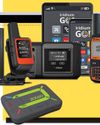
AFFORDABLE SATCOM
Communications devices using satellite technology are more abundant today than any time in the past. What's more, many are portable, ultra-compact, affordable relatively and designed for boating, dispelling any perceptions that you need a big, expensive dome antenna aloft to access satellite communications.

IN THE BEGINNING
REPOWERING FOUNTAIN HULL NO.1
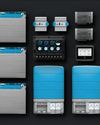
NAVICO GROUP FATHOM 2.0
Engine charging at 48 volts could be a game-changer.

PROPS FOR INNOVATION
Sharrow MX3 propellers live up to most of the company's performance-improvement claims.

MERCURY RACING 500R
Supercharged power for a variety of boats.
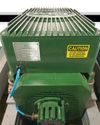
FLIPPING THE SWITCH
Much reporting focuses on reasons why one might choose electric marine power. The issues of range, speed, noise levels, winterizing and ethanol challenges, lake restrictions, environmental concerns and more all must be resolved on an individual basis. Little gets said about how a boater choosing to repower with electric actually gets that accomplished. Is it DIY? And if not, how does it get done?

TOW-VEHICLE TECH
If it's been a while since you bought new tow vehicle, you might be surprised by the many built-in advancements in trailering technology. New tow tech ranges from integrated weight scales and adaptive suspensions to systems that automatically back up your truck to hitch up your trailer. Here are a few examples to look for. -Jim Hendricks

MONUMENTAL TIPS FOR BACKING A TRAILER
Three Boating greats offer advice for a perennial reader query.
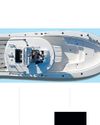
STICKING POINTS - Anchoring alternatives, and why you will always need a traditional anchor.
My brother-in-law likes to fish offshore reefs, and the process once entailed navigating to a mark, dropping a float, and idling upwind or up-current to drop the anchor in hopes the set would drop us back to the float.
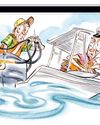
FOR WANT OF A CLAMP
When 100 miles from shore, home and help, this boater’s preparedness prevented potential catastrophe.